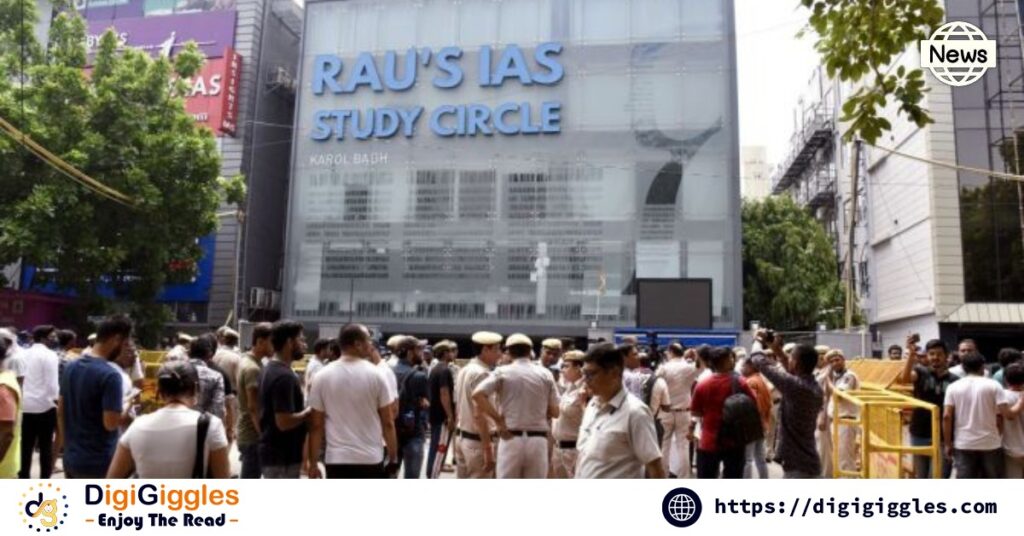
A tragic incident occurred at Rau’s IAS Study Circle coaching institute in Rajinder Nagar, Delhi, where three civil service aspirants lost their lives due to flooding in the basement on Saturday evening. The victims, Shreya Yadav from Uttar Pradesh, Tanya Soni from Telangana, and Navin Dalwin from Kerala, were caught in the deluge after heavy rains inundated the basement, which was being improperly used as a library instead of storage as specified by civic authorities.
The incident has sparked widespread student protests, with many accusing local authorities of gross negligence in enforcing safety standards in educational institutions. Protesters are demanding accountability and stricter regulations to prevent such tragedies in the future.
Safety Violations at Rau’s IAS Study Circle
The coaching centre had received a No Objection Certificate (NOC) earlier this month, clearing the use of a three-storey building, stilt parking space, and a basement designated for storage. However, the basement was being used as a library, violating civic authorities’ guidelines. Moreover, the basement lacked proper drainage facilities and had only one entry and exit point, exacerbating the risk during the flooding.
This negligence is not an isolated incident. According to a report submitted by the Delhi Police following the Mukherjee Nagar fire incident last year, only 67 out of 583 coaching institutes in Delhi have fire safety certificates. This glaring oversight puts thousands of students at risk daily.
Basement Construction and Usage Regulations
As per the Unified Building Bye-Laws for Delhi (2016), the construction and use of basements are strictly regulated to ensure safety. The rules state that basements must have a minimum height of 2.4 metres and adequate ventilation. Surface drainage must not enter the basement, and the walls and floors should be watertight. Access to the basement should be from the main or alternate staircase, and fire clearance is required for buildings with more than one basement. Rau’s IAS Study Circle violated these regulations, leading to the fatal incident.
Growing Concerns Over Coaching Institute Safety
The safety violations at Rau’s IAS Study Circle have highlighted a broader issue within Delhi’s coaching industry. Classrooms and libraries in basements without proper drainage facilities are common, posing severe risks to students. The government must take immediate action to enforce existing safety regulations and ensure that all coaching institutes comply.
Economic Impact of Coaching Institutes
Despite the safety concerns, the coaching industry in India continues to grow. The industry is worth Rs 58,088 crore, with civil services coaching institutes contributing Rs 3,000 crore. Delhi, often considered the hub of UPSC-CSE coaching, attracts lakhs of students from various states, including Bihar, Uttar Pradesh, Madhya Pradesh, and southern India.
According to data shared with the Rajya Sabha, the total GST collected from coaching centres across the country has more than doubled in the last five years, from Rs 2,240.73 crore in 2019-20 to Rs 5,517.45 crore in 2023-24. This economic growth underscores the need for stringent safety regulations to protect the numerous students relying on these institutions for their education.
Moving Forward
The tragic deaths of Shreya Yadav, Tanya Soni, and Navin Dalwin serve as a grim reminder of the consequences of negligence and regulatory failure. As student protests continue, there is a growing demand for accountability and immediate action to enforce safety standards across all coaching institutes in Delhi. The government and local authorities must prioritise student safety and ensure that such a tragedy never occurs again.